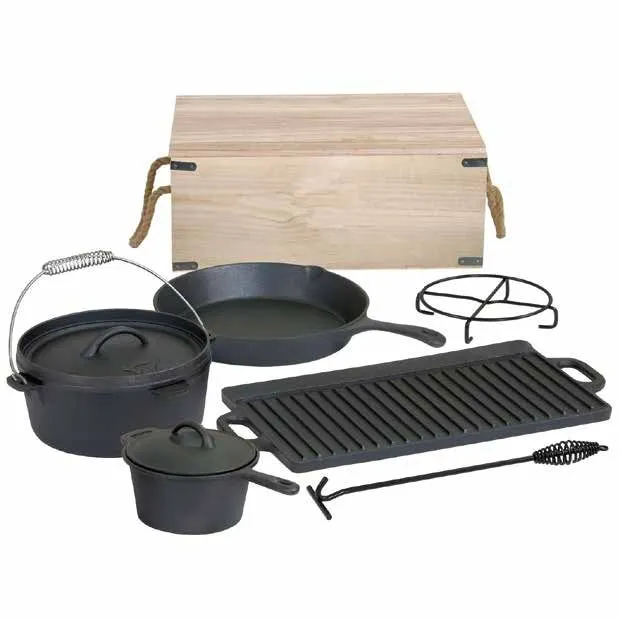
Understanding the Benefits and Uses of Cast Iron Skillets for Cooking
The Versatile Functionality of Cast Iron Skillets
Cast iron skillets have stood the test of time, remaining a staple in kitchens for centuries. Their enduring popularity can be attributed to a combination of unique features and versatile functionality that set them apart from other cookware materials. Whether you're a professional chef, an amateur cook, or someone who simply enjoys preparing meals at home, understanding the benefits of a cast iron skillet can change the way you cook.
Unmatched Heat Retention and Distribution
One of the most significant advantages of cast iron skillets is their ability to retain and evenly distribute heat. This characteristic makes them ideal for a variety of cooking techniques, from searing meats to baking cornbread. Unlike lighter pans that may have hot spots, cast iron skillets provide consistent temperatures throughout the cooking surface, ensuring that food cooks evenly. This is particularly important when frying, as it prevents food from becoming soggy due to inconsistent heat.
Natural Non-Stick Surface
With proper seasoning, cast iron skillets develop a natural non-stick surface that enhances their functionality. Seasoning involves applying a thin layer of oil and baking it into the surface, creating a polymerized layer that prevents food from sticking. This process not only allows for healthier cooking with less oil, but it also adds flavor to dishes over time. Unlike synthetic non-stick coatings that can flake off and require replacement, a well-maintained cast iron skillet can last for generations.
Versatility in Cooking Methods
A cast iron skillet is incredibly versatile and can be used for a wide range of cooking methods. Whether you're sautéing vegetables, frying chicken, baking, or even braising, a cast iron skillet can do it all. It can be used on the stovetop, in the oven, or even over an open flame, making it a perfect companion for both indoor and outdoor cooking. This adaptability means you can transition seamlessly from stovetop to oven without needing to transfer ingredients, simplifying the cooking process.
cast iron skillet function

Durability and Longevity
Cast iron skillets are known for their durability and longevity. Unlike some modern cookware that can warp, chip, or break, a cast iron skillet can withstand high heat and rough handling. When cared for properly, these skillets can last a lifetime or longer, often being passed down from one generation to the next. They are resistant to scratches and dents, making them an economical choice for home cooks who value lasting quality.
Health Benefits
Cooking with cast iron can also provide health benefits. When cooking with these skillets, trace amounts of iron are released into the food, which can help prevent iron deficiency, especially in individuals who may not receive enough from their diet. This natural mineral supplementation can contribute to overall health, making cast iron cookware not just functional but beneficial as well.
Easy Maintenance
Despite their durable nature, cast iron skillets are relatively easy to maintain. They require special care in terms of seasoning and cleaning, but this is outweighed by the advantages they offer. After use, it is recommended to rinse the skillet with hot water and scrub with a non-abrasive sponge. Avoid using soap, as it can strip away the seasoning layer. Keeping the skillet oiled after cleaning can help maintain its non-stick surface and prevent rust.
Conclusion
In conclusion, the cast iron skillet is a culinary workhorse that offers exceptional heat retention, versatility, and durability. Its natural non-stick surface, health benefits, and easy maintenance make it a fantastic choice for anyone looking to enhance their cooking experience. With a little care and proper seasoning, a cast iron skillet can become an invaluable tool in the kitchen, ready to tackle any recipe with finesse. Whether you're whipping up a hearty meal or baking a decadent dessert, there's no denying the essential role that cast iron skillets play in modern cooking.
-
Season Cast Iron Perfectly with GPT-4 Turbo TipsNewsAug.01,2025
-
High Quality Cast Iron Cookware - Baixiang County Zhongda MachineryNewsAug.01,2025
-
Premium Cast Iron Pan: Durable & Perfect HeatNewsAug.01,2025
-
High Quality Kitchen Durable Black Round Cast Iron Cookware Pancake Crepe Pan-Baixiang County Zhongda Machinery Manufacturing Co., Ltd.NewsAug.01,2025
-
Cast Iron Cookware - Baixiang County Zhongda Machinery | Nonstick, Heat ResistanceNewsAug.01,2025
-
High Quality Kitchen Durable Black Round Cast Iron Cookware - Baixiang County Zhongda Machinery | Non-Stick, Heat Retention, DurableNewsJul.31,2025


